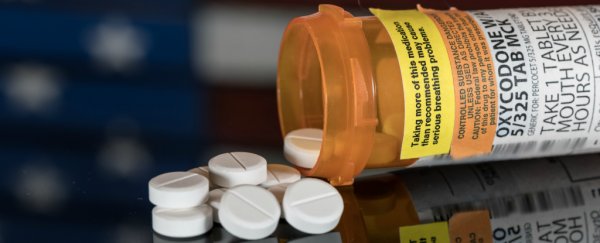DOWN WITH OPIOIDS. On Wednesday, health insurance organization Blue Cross Blue Shield (BCBS) published a new report about opioid use and abuse among the people it insures, and it included a bit of encouraging news.
For eight years, the company has measured the number of BCBS members diagnosed with an opioid use disorder. 2017 marked the first time since the company started keeping track that the rate dropped: from 6.2 in 1,000 people in 2016 down to 5.9 in 1,000 people in 2017.
According to the report, the number of filled opioid prescriptions decreased by 29 percent between 2013 and 2017, and the number of people who filled at least one opioid prescription throughout the year also dropped (from 20 percent in 2013 to 15 percent in 2017).
The report did not take into account BCBS members diagnosed with cancer, and it also excluded those undergoing palliative or hospice care.
THE BIG PICTURE. BCBS insures more than 100 million people in the United States — roughly a third of the nation's population — so the results of this report could be a reliable indicator of what's going on with the population at large. However, there could be other factors at play that might have skewed the numbers.
For example, perhaps people battling opioid addiction might less inclined to visit their doctor because doctors aren't prescribing opioids as readily. This could cause the number of opioid use disorder diagnoses to drop, but wouldn't actually say much about the number of people addicted to opioids.
The BCBS report also doesn't take into account illegal sources of opioids — sure, people may be filling fewer opioid prescriptions, but if that's just because they're turning to heroin instead, it's not exactly good news.
CAUTIOUSLY OPTIMISTIC. Ultimately, the BCBS report is encouraging, but it's just one report; others have estimated that the epidemic getting worse, not better. Clearly, America's battle with opioids is far from over — a fact not lost on Trent Haywood, senior vice president and chief medical officer for BCBS Association (BCBSA).
"We are encouraged by these findings, but we remain vigilant," he said in a news release.
"More work is needed to better evaluate the effectiveness of treatment options and ensure access to care for those suffering from opioid use disorder."
The company seems committed to putting in that work. The same day it released the report, BCBSA announced plans to open Blue Distinction Centers for Substance Use Treatment and Recovery and launch a national hotline to help connect those battling opioid addition with treatment centers, whether they're BCBS member or not.
Ultimately, it's public health initiatives like those that experts believe are most likely to truly reduce the number of Americans battling an opioid use disorder.
Science AF is ScienceAlert's new editorial section where we explore society's most complex problems using science, sanity and humor.
This article was originally published by Futurism.
